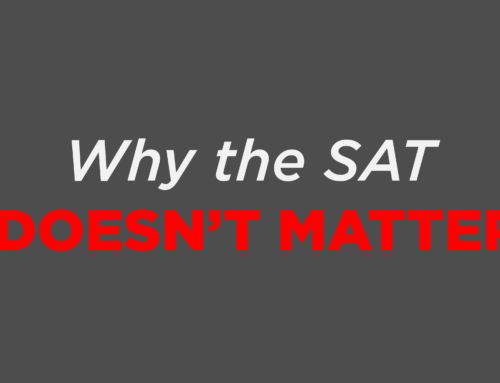A lot of things make me cringe.
I cringe when I hear that Kanye West is planning to run for president in 2020.
I cringe when I think about the dentist.
I cringe when parents ask me to tutor their 7th-graders for the ACT.
But lately, there’s something that’s been making me cringe more than usual.
It’s students who insist on taking the new SAT.
Isn’t it ironic that in a world where students and parents make calculated decisions about the classes they’ll take, the extracurriculars they’ll participate in, the thank you notes they’ll send, all to improve their chances at admission, that they would choose to take a test that will have the opposite effect?
But why exactly will taking the new SAT hurt students applying to college? It’s simply because taking the new SAT is MUCH Riskier.
Don’t Be the College Board’s Gerbil
We know very little about the redesigned SAT. It’s a completely new test, and although the College Board has released 4 practice tests, it hardly compares to the nearly 30 years of experience and dozens of practice tests that students and tutors have access to for the ACT.
Because there is such little information available about the new SAT, it will be much more difficult for students to give themselves a competitive advantage by prepping.
“But I want my dear Matilda to apply to the Ivy League Universities! Surely the SAT is viewed more favorably by the more prestigious institutions…”
Poppycock. All 4-year schools in the US, from the most prestigious Ivy League to the least prestigious state university give the SAT and ACT equal importance.
The Rise of the ACT
While historically, the SAT was the more popular test (especially in the Northeastern US), since 2012 more students have been taking the ACT. Students simply liked it more.
They liked that there was no guessing penalty, no obscure vocabulary, and no mandatory essay, and students didn’t feel that the ACT was trying to trick them—a hallmark of the old-SAT.
Considering that the majority of these new changes to the SAT (no more obscure vocabulary, no more guessing penalty, no more mandatory essay) make it more like the ACT, doesn’t it make sense that the only reason the SAT has changed is to try and win back the market share the College Board has lost to its competitor?

In 2012, the ACT surpassed the SAT in number of test-takers.
Should You Take Both the ACT and SAT?
“But won’t Matilda benefit from showing her colleges that she’s taken both tests?”
Nope. Since both tests are weighed equally by all US universities, one is all you need.

Don’t sneer at the ACT. It’s actually outcompeting the SAT.
Quality is better than quantity here. If you can get your ideal score for one test, there’s no reason to take the other. Trying to prep for both tests will only take more time and energy away from your grades in your high school classes, one of the most important factor in college admissions.
“But shouldn’t Matilda take both tests to see on which one she performs better?”
In the past, the answer to this might have been different because the 2400 SAT was quite different from the ACT. Students who were better creative problem solvers naturally did better on the SAT, whereas students who preferred a more straightforward test style, a lack of obscure vocabulary, no guessing penalty, and an optional-essay, tended to do better on the ACT. Because the SAT has changed to become more like the ACT, these differences in test performance have disappeared for the most part, making taking both a moot point.
Besides, since colleges look at both tests equally, why not take the test we know more about?
Although they are much more similar tests now, when I took the May SAT I realized there were two differences worth mentioning. First, the pacing was a little more forgiving on some sections on the new SAT. Second, the no-calculator test on the Math section of the new SAT makes the Math section more difficult than the Math section on the old SAT and the ACT.
That being said, do the benefits outweigh the disadvantages? I think not.
In Summary…
- The SAT and ACT are viewed equally by virtually all US Universities
- More students today currently take the ACT
- It’s riskier to prep for the new SAT than for the ACT
- The new SAT has become more like the ACT, eliminating major differences between the two.
So, what should you do with this information?
TAKE THE ACT! But hey, that’s just my opinion.
What do you think?
Is there any compelling reason why you or your student might opt to take the new SAT?




